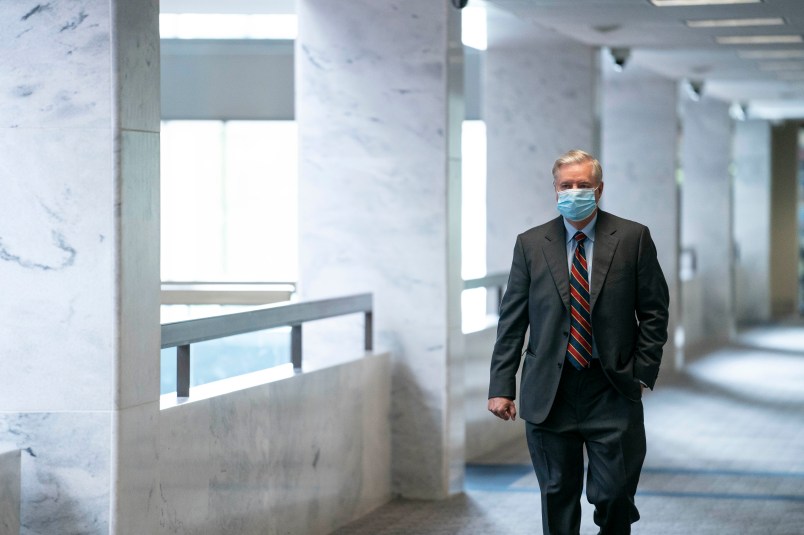Senator Lindsey Graham (R-SC) was supposed to put his uncomfortably close reelection race to rest with his starring role in an October drama: the confirmation of Supreme Court nominee Amy Coney Barrett.
The Senate Judiciary Committee chairman, Graham got a gavel and the limelight as he shepherded conservatives’ dream judge onto the bench despite the heat of Democratic fury. He could at once contribute to the Trump administration’s radical transformation of the judiciary, emphasize his importance to voters and count a generation of aggressively conservative jurisprudence as his own personal achievement.
Alas, some shows just never live up to the hype.
Graham used his opening statements during the hearings as mini-stump speeches, opining about Obamacare in South Carolina, bragging about his efforts to ban abortions after 20 weeks, touting upcoming legislation with the hearings’ breakout star, Sen. Sheldon Whitehouse (D-RI), about dark money and the judiciary.
He even snuck in, apropos of nothing, that he and President Donald Trump had casually chatted during one of their golfing excursions about the assassination of Qasem Soleimani.
But despite Graham’s best efforts, Barrett’s rushed confirmation somehow got nudged to the electoral back burner.
Perhaps it was the inevitability of Barrett’s successful confirmation, or Trump’s COVID-19 diagnosis, or just the frenetic pace of the final lap of a massively important presidential campaign — either way, the Barrett confirmation became one of many headlines instead of the marquee story.
It was only briefly mentioned at Thursday’s presidential debate, the last of the cycle, as the premise for a question on health care plans. Polling reflects that the open court seat hasn’t had a significant impact on the presidential race, and a CNBC poll published Tuesday shows that a majority of voters in six swing states want COVID-19 relief legislation prioritized ahead of Barrett’s confirmation.
With his big fall boost less powerful than he’d hoped, Graham is now locked into the fight of his political life with Jaime Harrison, the former South Carolina Democratic party chairman.
Since September, the polls have tightened considerably from a summer stretch that saw Graham consistently ahead, even if it was usually only by mid-single digit leads. During October, Harrison and Graham have been trading one- or two-point leads back and forth. A Morning Consult poll released Thursday showed Harrison not only making up a six-point deficit from earlier in the month, but even surpassing Graham by two points.
Meanwhile, Harrison is raking in tons of money. A fundraising juggernaut, he broke an eye-popping new record with his latest FEC filings, according to the Charleston Post and Courier, becoming the first Senate candidate in American history to raise and spend more than $100 million. The previous record was set by Sen. Rick Scott (R-FL) at $85 million (though more than $73 million of that was his own family’s money).
When asked about his record-shattering fundraising haul Friday on MSNBC, Harrison brought the conversation back to insufficient health care and crumbling infrastructure in the state, juxtaposing Graham as someone far away and out of touch.
“I hope the voter that is voting for Jaime Harrison is a voter who wants to bring hope back to South Carolina,” he said, “who is tired of Lindsey Graham going to Washington D.C. trying to represent D.C. interests and not represent the interests of the folks of South Carolina.”



